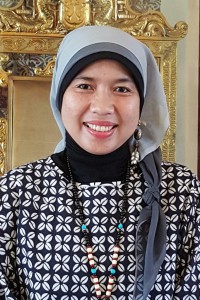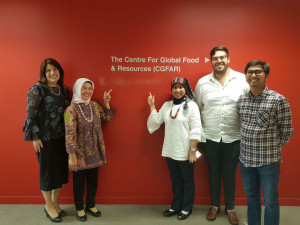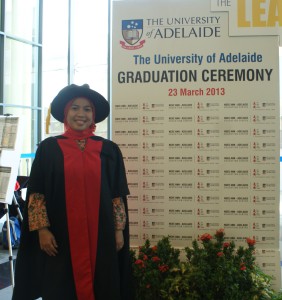 Blog post prepared by Rohan Yargop
Blog post prepared by Rohan Yargop
At the Centre for Global Food and Resources (GFAR), we take pride in training and creating tomorrow’s leaders in agribusiness and international development. Our strong alumni base is comprised of more than 30 countries involved in major agriculture related organisations in private and public sector, working towards the betterment of the global community. The success of our alumni is a testament to the hard work, dedication and their commitment to succeed in the field they have chosen. We are always excited to hear about the achievements of our alumni and cherish their success. A few weeks ago, we were thrilled to hear one such success story from one of our past PhD students from Indonesia.
Sahara Djaenudin was a young mother of two when she moved to Adelaide to start a PhD with us as a John Allwright Fellowship Scholar for Australian Centre for International Agricultural Research (ACIAR) in 2008. Juggling between her studies commitments and caring for two young children, Sahara finished her PhD in 2012 and moved back to Indonesia to undertake research and teach at Bogor Agricultural University (IPB) in Bogor, Indonesia. Recently Sahara was appointed as the Head of School of Economics at IPB. Over the last 8 years, Sahara has collaborated with us in numerous projects funded by ACIAR. She considers this partnership vital to her success and the development of her career.
We asked Sahara to share her experience of studying with us and give some advice to young professionals aspiring to work in agribusiness and international development. Here is what Sahara had to say…
What inspired you to get into the field of Agricultural Economics and International Development?
Agriculture is an important sector for Indonesia. The agricultural sector in Indonesia is dominated by the presence of small farmers who face several constraints including knowledge and capital constraints. The constraints are not only at farm level but also at the marketing level. While markets for agricultural products evolve (modern market reformation), it is important to facilitate the adjustment of small farmers to a new Agri-food system. For example, how to link small farmers to supermarket channel that perform with strict requirements. These challenges inspired me to study more about agriculture in Indonesia and globally.
Can you narrate briefly about your experience of studying your PhD at GFAR with Prof. Stringer and Prof. Umberger?
I was blessed to have extraordinary supervisors like, Prof. Randy Stringer, Prof. Wendy Umberger and Dr. Amos Gyau. I thank them for their valuable assistance, guidance, encouragement, and support during my studies. They gave me the opportunity to join their ACIAR project from which I obtained the data for my PhD thesis.
One thing I have learned from Randy and Wendy is that they always involve their students in their projects, which allows their students to gain practical research skills by conducting high quality research with continuous guidance and support from them along with funding.
What were some of the major challenges in your PhD journey and how did you deal with them?
I remember, we had to move from one office to another office, from the main building of Waite Campus, to the Plant Research Centre, and then to the North Terrace campus in the city. So on an average, we moved to a new office once a year.
Second, when I studied PhD in Adelaide, I was a single parent since my husband could not join us due to his job in Indonesia. I had to take care of two children (4 and 7 years old kids). I am so thankful that, Randy and Wendy understood my situation. I remember when Randy talked to me that I differed from other PhD students since I was a single mom in which I had to take care of two children. I had to work during the night when my kids were asleep so that I could finish my thesis in time.
If you remember some interesting stories from your PhD days (about GFAR, or Adelaide or during your fieldwork) can you please share them with us?
During my study, I learned two things: first, how to conduct high quality research and second, how to deliver the results of the study effectively. My supervisors provided full support and guided me to conduct high quality research starting from the preparation, scoping of the study, constructing the questionnaire, testing the questionnaire, revising the questionnaire, conducting face-to-face interviews, cleaning data and analyzing the data. They also guided us on delivering the results of the research. Randy and Wendy always emphasized practicing before we made any presentations. During the practice, they provided comments related to the contents, slide style, timing and our gestures during the presentation. I remember when Randy stated “Even I always practice before delivering presentation” meaning that practice before presentation is an obligation. Even today, I always practice before delivering any talk or presentation.
How has the experience been on working with GFAR and ACIAR on some of the key ACIAR projects including IndoHort and IndoDairy?
Doing research with GFAR and ACIAR has meant that I have had the opportunity to conduct high quality research and contribute to high quality journals. Being involved in the projects has provided me with the opportunities to: (1) write publications that proved vital for my career and (2) develop strong networks in Indonesia and Australia.
What is your advice for young/Early career researchers to achieve success in this field?
Hard work and never give up! For the PhD students please follow the guidance from your supervisors. The supervisors want the best for you and as such, they demand you to be serious in producing a high quality research output.
Is there anything else you would like to share with us that has made this journey memorable?
Never be afraid to learn something new. Studying abroad was a new experience for me at the time and it was challenging for my family and me. However, through the support I received I could overcome those challenges and get my PhD.
We would like to Congratulate Sahara on this success and wish her all the best in all her future endeavors.



